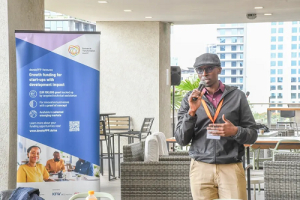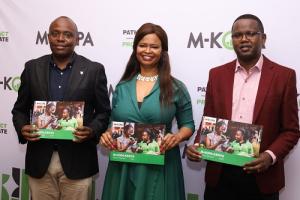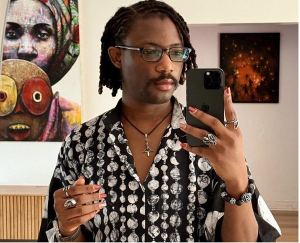La Rédaction
L’accélérateur OceanHub Africa ouvre les candidatures de sa 7e cohorte
L’initiative OceanHub Africa lance les candidatures pour la septième édition de son programme d’accélération de douze mois, qui accompagnera jusqu’à vingt-quatre jeunes pousses africaines à impact engagées pour la préservation des océans. Les start-up sélectionnées bénéficieront d’un accompagnement hybride, d’un accès à un réseau international d’experts, d’investisseurs et de clients, ainsi que d’avantages en services et logiciels. Les inscriptions sont ouvertes ici jusqu’au 30 décembre.
Lire aussi:
Konnadex obtient une subvention pour promouvoir les paiements en stablecoins au Nigeria
Gabon : le Codes Africa débarque à Libreville le 4 décembre
Le chapitre gabonais du Congo Digital Economy Summit (Codes Africa) organise le jeudi 4 décembre, au Radisson Blu de Libreville, une rencontre régionale consacrée à la coopération, l’interopérabilité et la souveraineté numérique en Afrique centrale. L’événement, soutenu par l’Association des régulateurs des télécommunications d’Afrique centrale et le cabinet de conseil Deloitte, réunira des décideurs publics et privés autour des enjeux stratégiques du numérique.
Lire aussi:
Kenya : les candidatures pour la cohorte 10 du develoPPP Ventures sont ouvertes
Chui Ventures dépasse les 17 millions $ pour son premier fonds panafricain
Le fonds d’amorçage africain Chui Ventures clôt son premier véhicule à 17,3 millions de dollars, bien au‑delà de l’objectif initial de 10 millions. Soutenu par des fondations et une majorité d’investisseurs individuels africains, il a déjà financé 18 jeunes pousses dans 5 pays et prépare un second fonds de 60 millions de dollars pour étendre sa stratégie, notamment vers l’Afrique du Nord. Son portfolio couvre les domaines de la fintech, de la healthtech, du commerce électronique, de l'agritech et de la logistique.
Lire aussi:
Paystack licencie son cofondateur Ezra Olubi pour atteinte à sa réputation
Stokvel Academy finance la numérisation des tontines en Afrique du Sud
L’entreprise sociale sud-africaine Stokvel Academy obtient un financement d’E Squared Investments pour lancer le programme Stokvel Agent Accelerator. Sur dix-huit mois, vingt-cinq jeunes seront formés comme agents financiers pour numériser plus de trois mille quatre cents tontines, renforcer leur gouvernance et diffuser l’éducation financière au sein des communautés de Soweto et de la région du Vaal.
Lire aussi:
Nigeria : ClapMi décroche une subvention pour sa plateforme de streaming Web3
La start-up nigériane ClapMi obtient une subvention de 20 000 $ (environ 29 millions de nairas) du protocole Lisk pour accélérer sa plateforme de diffusion en direct centrée sur les créateurs, qui combine expérience utilisateur classique et récompenses en chaîne. Ce financement doit servir à améliorer le produit, recruter davantage de créateurs et affiner les mécanismes de rémunération fondés sur l’engagement des fans.
Lire aussi:
Nigeria : DingPay, AquaTrack et Growwr récompensées aux premiers Verto Awards
Konnadex obtient une subvention pour promouvoir les paiements en stablecoins au Nigeria
La jeune pousse nigériane Konnadex reçoit une subvention de vingt mille dollars du protocole Lisk pour accélérer son portail de paiement en stablecoins destiné aux commerçants. La plateforme propose facturation sur chaîne, liens de paiement et automatisation du rapprochement pour rendre les règlements en cryptomonnaies plus fluides. Ce financement valide son positionnement, mais reste une première étape avant un passage à l’échelle.
Lire aussi:
Google lance Nano Banana Pro, un nouvel outil pour des images IA en très haute qualité
Kenya : les candidatures pour la cohorte 10 du develoPPP Ventures sont ouvertes
Les candidatures pour la dixième cohorte du programme develoPPP Ventures sont ouvertes pour les jeunes pousses kényanes déjà génératrices de revenus. Les start-up retenues peuvent obtenir jusqu’à 100 000 euros (environ 113 000 dollars), de financement non dilutif assorti d’un appui technique pour accélérer leur croissance et renforcer leur impact social, économique ou environnemental dans la région.
Lire aussi:
La start-up nigériane Cubbes remporte le grand prix de Zeckathon 5.0
Nigeria : DingPay, AquaTrack et Growwr récompensées aux premiers Verto Awards
Les start-up nigérianes DingPay, AquaTrack et Growwr ont remporté un total de quinze mille dollars lors de la première édition des Verto Global Business Awards, organisée à Lagos. Le concours, lancé par la fintech Verto, distingue des start-up africaines en phase d’amorçage à fort potentiel international, en combinant des dotations financières, un mentorat, une visibilité mondiale et un accès à son infrastructure de paiements transfrontaliers.
Lire aussi:
Nigeria : l’État de Kwara organise un sommet sur l’IA les 27 et 28 novembre
M-KOPA franchit 1,6 milliard de dollars de prêts au Kenya
M-KOPA Kenya, filiale de la société financière M-KOPA Holdings, annonce avoir accordé 1,6 milliard de dollars de crédit à ses clients dans le pays, en grande partie via le financement de smartphones. L’entreprise revendique 4,8 millions de clients servis en quinze ans et s’impose comme un acteur clé du crédit pour les ménages à faibles revenus.
Lire aussi:
Egypte : Bluworks lève 1 million $ pour étendre sa plateforme RH
Paystack licencie son cofondateur Ezra Olubi pour atteinte à sa réputation
La fintech nigériane Paystack a licencié son cofondateur Ezra Olubi (photo), invoquant une atteinte grave à la réputation liée à d’anciens tweets polémiques remis en circulation. L’entreprise précise que cette décision, prise dans le cadre contractuel, est distincte de l’enquête indépendante toujours en cours sur des accusations d’inconduite au travail, et que toutes ses obligations financières envers lui ont été honorées.
Lire aussi:
Seedstars et SANAD lancent un programme pour les entrepreneures en Afrique











